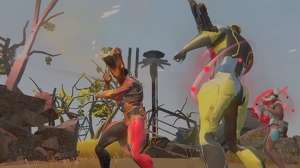
There’s been a recent rise in Afrofuturist stories. Authors such as Nnedi Okorafor, N.K. Jemisin and Rivers Solomon have become wildly popular, and Marvel’s Black Panther celebrated an African perspective on science fiction on the big screen. Games are set to follow – Furi by The Game Bakers and Beautiful Desolation by the Brotherhood are two examples of games interested in the culture and visuals of a continent that too often gets overlooked. Similarly, We Are The Caretakers, which entered Steam Early Access on April 21 (and which will also be released for Xbox Series X|S), actually isn’t set in Africa, but a whole new world called Shadra, an analogy for real places and events, that focuses on telling a story about poaching and conservation efforts, a hitherto unique topic for a game.
We Are The Caretakers offers XCOM as a point of comparison, but while there are similarities in the hub and squad management, what I played felt like a squad-based CRPG, first and foremost. Combat is round-based, and exploration on the map involves your squad leader leading the way, with the rest of the group trailing behind. The game’s character design is immediately striking – everyone wears large, colourful masks of gleaming metal, shaped in intricate ways, as well as matching, sleek suits. I can’t help but wonder how these characters see, or move with these massive things on their heads, but they look beautiful and strong. You take control of the fittingly named Conductor, the freshly minted head of the Caretakers, a unit dispatched around Shadra to stop poachers in their tracks. Early on, your squad gains a Raun, a rhino-dinosaur(?) hybrid, and member of the species you’re committed to protect. It is of course unbearably cute.
Developer Heartshaped Games invested ample time in researching the complex topic of illegal wildlife trade and the work rangers do to combat it, and works with a diverse roster of collaborators, among them narrative director Xalavier Nelson Jr., who sees the Early Access period as a chance to listen to the community to make sure the concerns Afrofuturism deals with are authentically represented. “It was important to us to authentically represent the rangers we spoke to and the landscapes they worked in,” says Heartshaped Games founder Scott Brodie. “We knew how important technology was to modern conservation and anti-poaching efforts, so we were always leaning towards sci-fi as a genre.”
